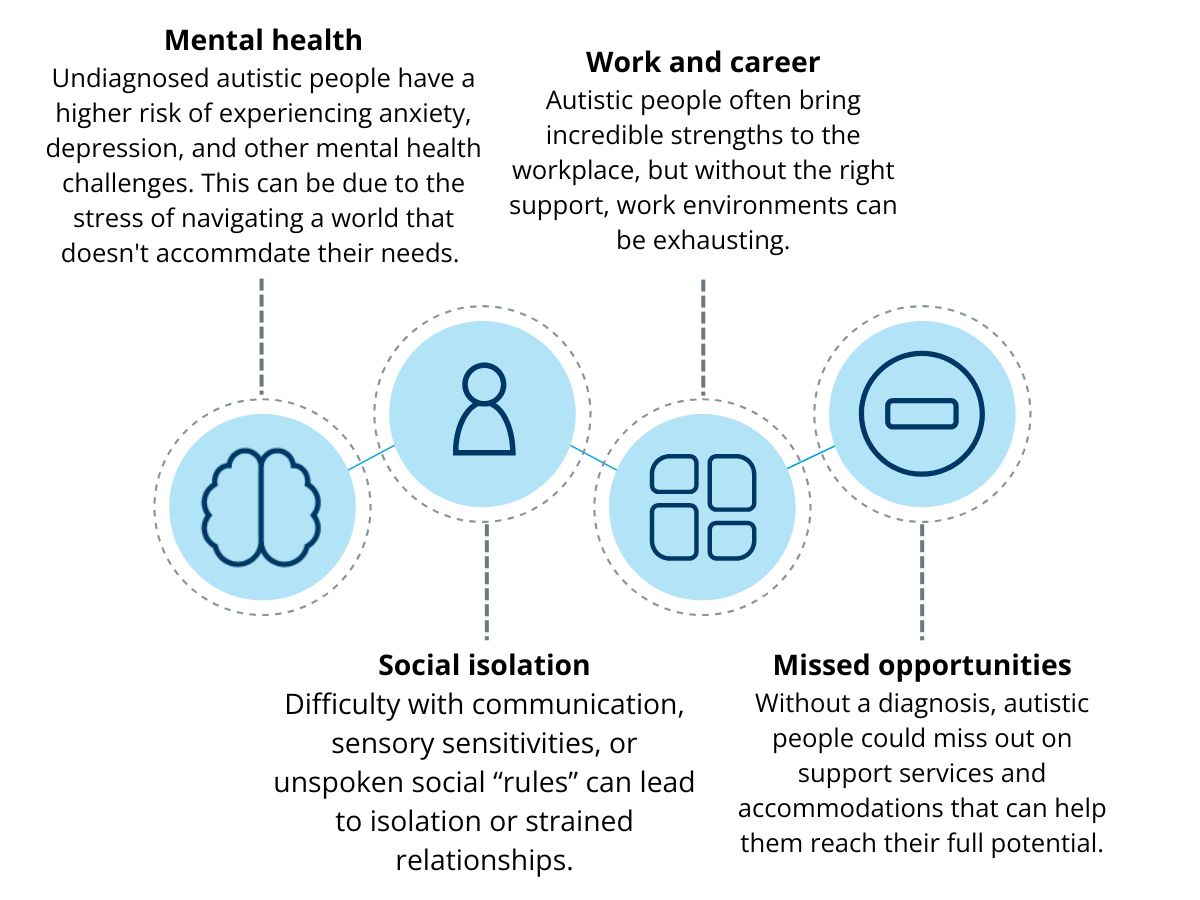Autism spectrum condition (ASC) is a lifelong developmental condition that affects how individuals perceive and interact with the world around them. Autism is often associated with childhood, but many autistic adults go through life without ever receiving a diagnosis.
If you’ve ever felt different but couldn’t quite put your finger on why, or if social situations, sensory sensitivities, or communication challenges have always felt harder for you than for others, you may be on the autism spectrum without realising it. Undiagnosed autism in adults can come with challenges, but the right support can help you to excel at work in everyday life.
In this blog, we’ll explore what it means to be an undiagnosed autistic adult, the challenges this can bring, and why a diagnosis can be life-changing.
The hidden spectrum: Undiagnosed autism in adults
Being autistic but undiagnosed means that someone has traits of autism but hasn’t received a formal diagnosis. The reasons for remaining undiagnosed can vary, including:
- Limited awareness – Many people have grown up hearing outdated stereotypes of autism. If you don’t fit those, it’s easy to overlook your
- Gender bias – Historically, autism has been diagnosed more frequently in men, meaning many autistic women and non-binary people have been overlooked.
- Changing diagnostic criteria – Our understanding of autism has improved over the years. Many adults who didn’t meet past definitions might now qualify for a diagnosis.
- Masking and coping strategies – Many autistic people develop ways to “blend in” with societal expectations, making their autism less visible to others.
If any of this resonates with you, you’re not alone. Many adults only start considering autism after recognising traits in their children, experiencing burnout, or through learning more about neurodiversity.
The impact of undiagnosed autism
Going through life without understanding your neurodivergence can be tough. Undiagnosed autism can affect many aspects of daily life, including:

Why getting a diagnosis can help
A formal autism diagnosis isn’t necessary for everyone, but for many, it brings clarity and access to support. Here’s why it can be valuable:
- Self-understanding – Learning that you’re autistic can help explain lifelong challenges and provide relief and validation.
- Stronger relationships – When you and those around you understand your communication style and needs, your relationships can improve.
- Workplace accommodations – A diagnosis can help you access reasonable adjustments at work, making employment more manageable and fulfilling.
- Access to support – A diagnosis can open doors to therapies, resources, and accommodations tailored to your needs.
For many adults, finally understanding their autism is a turning point, one that allows them to stop blaming themselves and start advocating for what they truly need.
How to seek a diagnosis
If you think you might be autistic and want to explore a diagnosis, here are some steps to consider:
- Talk to a professional – Your GP or a private clinic specialising in autism assessments can help you take the first steps. At Aim Forward, we offer workplace or study needs assessments with qualified, experienced professionals.
- Use self-assessment tools – Online autism self-assessment quizzes can be a helpful first step, though they don’t replace a formal diagnosis.
- Join support groups – Connecting with other autistic adults can be eye-opening and help you feel understood.
- Advocate for yourself – If you feel a diagnosis would help you, don’t be afraid to push for an assessment. You deserve support and understanding.
Many autistic adults go undiagnosed for years, but it’s never too late to explore your neurodivergence and seek the support you deserve. A diagnosis isn’t about a label; it’s about understanding yourself.
At Aim Forward, we believe in embracing neurodiversity and supporting individuals in shaping a future that works for them. Whatever path you choose, you deserve to be seen, heard, and supported, just as you are.
Get in touch with our friendly team for more information about how we can support you.


Recent Comments